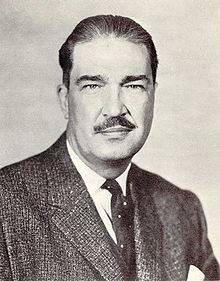Or:
A race that has become too imbecile
to be biologically viable

by Revilo Oliver
What has happened to the evangelical atheists without their being aware of it is clear. When they expelled their faith in Christianity, they created within themselves a vacuum that was quickly filled by another faith. And the fervor with which they hold that faith is of religious intensity. They preach the joyful tidings that there is no God with as much ardor and sincerity as ever a Christian preached his gospel. They sacrificed themselves, and some even underwent martyrdom, for their faith. If we wanted to indulge in paradox, we could describe them as the zealots of an anti-religious religion, but it is more accurate to say that their faith in a religion, which was rational in that it expected miracles only from the supernatural power of its invisible deity, was replaced by a superstition that expects miracles from natural causes that have never produced such effects—a superstition that is totally irrational.
Societies for the promotion of atheism as such are relatively innocuous and merely exhibit on a small scale a psychological phenomenon that has catastrophic effects when it occurs on a large scale, much as sand spouts and dust devils are miniature tornadoes. When religious faith is replaced by materialistic superstition on a large scale, the consequences are enormous devastation.
The great wave of anti-Christian evangelism swept over Europe about the middle of the Eighteenth Century, and its natural results were most conspicuous in France, where decades of strenuous social reform imposed by a centralized government under a king whose mediocre mind had been thoroughly addled by “Liberal” notions, naturally triggered the outbreak of insanity and savagery known as the French Revolution. Since the shamans and fetish-men of the new superstition control our schools and universities today, the history of that event is little known to the average American, who is likely to have derived his impressions, at best, from Carlyle’s novel, The French Revolution, and, at worst, from the epopts and fakirs of Democracy. Obviously, we cannot here insert an excursus of a thousand pages or so on what happened at France at that time, nor need we. The efforts at social uplift through economic and political reforms during the reign of Louis XVI are well summarized by Alexis de Tocqueville in The Old Régime and the French Revolution. The best short account in English of the underlying forces of the disaster is the late Nesta Webster’s The French Revolution, supplemented by the two volumes of her biography of Marie Antoinette and Louis XVI and the pertinent chapters of her World Revolution.
* * *
We should not damn Rousseau for his influence. The real gravamen of guilt falls on the educated, skeptical, intellectual society that did not laugh at his fantasies about the innate Virtue of hearts uncorrupted by civilization, the Noble Savage, the Equality of all human beings, who can become unequal only through the wickedness of civilized society, the sinfulness of owning property of any kind, and the rest of the tommyrot that you will find in the thousands of printed pages of Rousseau’s whining and ranting. You can read all of it—if you grit your teeth and resolve to go through with it—and you really should, for otherwise you will not believe that books so widely read and rhapsodically admired can be so supremely silly and so excruciatingly tedious.
What Rousseau’s fantasies produced is an amazing superstition. It is not exactly an atheism, for a vague god was needed to create perfectly noble savages to be corrupted by civilization, and to inspire perfectly pure hearts, like Rousseau’s, that overflow with Virtue and drip tears wherever they go; but for all practical purposes, Rousseau’s creed substituted “democracy” for God, and put civilized society in place of the Devil. It replaced faith in the unseen and empirically unverifiable with faith in the visibly and demonstrably false.
No such apology can be made for the mighty minds that were stunned by Rousseau’s drivel. They could have tested the proposition about natural Equality by just walking down the street with their eyes open, looking inside the nearest prison, or paying a little attention to the conduct of any one of the score of really noteworthy degenerates of very high rank. They must have met every day military men and others who had observed savages in their native habitat and could comment on the innate nobility of the dear creatures. And some conversation with a few footpads and cutpurses would have elucidated the problem whether or not Society was responsible for their having been born without a conscience, wings, and other desirable appurtenances. In fact, no rational person could have escaped a daily demonstration that Rousseau’s babble was utter nonsense—except, perhaps, by confining himself in a windowless and soundproof room. But the philosophes were able to attain in their own capacious minds a far more total isolation from reality.
Our hyperactive imaginations usually act in concert with the generous impulses that are peculiar to our race—so peculiar that no other race can understand them except as a kind of fatuity from which they, thank God!, are exempt. Long before we began to indulge in international idiocy on a governmental scale, it was virtually routine for Americans to hear that the Chinese in some province were starving, and within a few weeks numerous individuals, many of them comparatively poor, made private contributions, and food was bought and shipped to the starving (if the collections were honestly made). Now I do not deprecate that exercise of charity, which is a virtue that we instinctively admire, but we should understand that although the Chinese gladly ate the food and politely said “thank you,” they privately concluded that we must be weak in the head. They would never have done anything of that sort, not even for men of their own race in a neighboring province. The White Devils, they decided, must have maggots in their minds. Sympathetic generosity, however, is a virtue or vice of our race, and we shall have to live with it.
What happened in the Eighteenth Century was that Rousseau’s fantasies so excited imaginations and generous impulses that the reasoning mind lost control.
There is, however, a second factor more important for our purposes here. You will find a clear illustration in our recent history, during the presidency of Woodrow Wilson, who appears to have been a not uncommon combination of mental auto-intoxication with corrupt ambition, and who was appointed President after the resident General Manager, Barney Baruch, and his crew had (as one of them boasted to Colonel Dall) led him around “like a poodle on a string,” taught him to sit up and bark for bonbons, and made sure that he was well trained. As we all know, Baruch eventually decided that it would be good for the Jewish people to prolong the war in Europe, so that more Indo-Europeans would be killed and more of their countries devastated, and that the time had come to repay Germany and Austria for their generosity toward the Jews, who had been given in those countries more of economic, social, and political dominance than in any other European nation. It followed therefore that the thing to do was to stampede an American herd into European territory.
Our concern here is with the herd: what set it in motion? We all know how credulous individuals, many of whom had visited Germany and knew better, were impelled to imagine pictures of the evil War Lord, Kaiser Wilhelm II, and the terrible Huns—pictures that were as vivid and convincing as the vision of the monster Grendel that we see every time we read Beowulf. And, of course, there was much rant about supposed violations of a code of chivalry that no one even remembered a few years later. A college professor with some reputation as an historian was hired, doubtless for a small fee, to prove that wars are caused by monarchies, although he somehow forgot to mention the terribly bloody war that had taken place on our soil some fifty years before and which had obviously been caused by the dynastic ambitions of King Lincoln and King Davis. And, naturally, the press was filled with many other ravings. So pretty soon the Americans found themselves engaged in a “war to end wars” and a “war to make the world safe for democracy.” It would probably have been a little more expensive—good propaganda costs money—to make them fight a “war to end selfishness” and a “war to make the world safe for goblins,” but it doubtless could have been done. Green snakes are not much harder to see on the wall than pink elephants.
We must not tarry to discuss either the methods of the conspirators who so easily manipulated the American people or the folly of those who were manipulated. Let us consider our enthusiastic rush on Europe as an historical movement.
If, taking the larger view, you ask yourself what that movement most resembled, you will see the answer at once. It was a crusade—or, to be more exact, an obscene parody of a crusade. It was a mass movement inspired by a fervor of religious intensity.
The Crusades, which mark the high tide of Christianity, were (given our faith) entirely rational undertakings. (Except, of course, the so-called Children’s Crusade, which is significant only as evidence that even at that early date some members of our race had a pathological propensity to have hallucinatory imaginations.) It was obviously desirable that Christendom own the territory that was a Holy Land, where its God had appeared on earth and whither many pilgrims journeyed for the welfare of their souls. The Crusades were, furthermore, the first real effort of European unity since the fall of the Roman Empire, and they were also a realistic missionary effort. It was impossible to convert Orientals to Christianity, but it was possible to make Orientals submit to Christian rulers. The Crusaders established the Kingdoms of Cyprus and Jerusalem and the Principalities of Edessa, Tripoli, and Antioch—and eventually they found it necessary to capture Constantinople. But they could not take Baghdad and their high emprise ultimately failed for reasons which need not concern us here. The Crusades were, as we have said, the high tide of Christianity.
Wilson’s fake crusades against Europe evoked from the American people the energies and spirit that the real Crusades had aroused in Europe, and while we must deplore their delusions, we must admire the unanimity and devotion with which the Americans attacked and fought the Europeans. (Of course, we did not actually fight Great Britain, France, and Russia, our ostensible allies; they were defeated in other ways.) The crusade was irrational, however, because it was prompted, not by religion, but by the debased and debasing superstitions represented by Rousseau.
From about the middle of the Eighteenth Century to the present we have witnessed the spread and propagation throughout the West of a superstition that is as un-Christian as it is irrational, as obviously contrary to the Scriptures and tradition of Christianity as it is a blanket denial of the reality that all men see and experience every day—a superstition by which faith in an unseen God is replaced by hallucinations about the world in which we live. After that grotesque superstition inspired the most civilized and intelligent part of France to commit suicide, and loosed the frenzied orgy of depravity, crime, and murder called the French Revolution, its influence was contracted by a resurgence of both Christian faith and human reason, but recovering its malefic power over the imagination and sentimentality of our people, it grew again and as a succedaneous religion it gradually supplanted Christianity in the consciousness of both unintelligent non-Christians and infidel Christians, paralyzing both reason and faith.
This grotesque caricature of religion is now the dominant cult in the United States: its marabouts yell from almost all the pulpits; its fetish-men brandish their obscene idols before all the children in the schools; its witch-doctors prance triumphantly through all the colleges and universities. And virtually everyone stands in fearful awe of the fanatical practitioners of mumbo-jumbo. Both the God of Christendom and the reasoning mind of our race have been virtually obliterated by the peculiar system of voodoo called “Liberalism.”
It is obvious that this mass delusion is leading, and can lead, to but one end. James Burnham named it correctly in his generally excellent book, Suicide of the West.
It can be argued—and argued very plausibly—that a race that could long accept the “Liberal” voodoo-cult as a substitute for both its religion and its powers of observation and reason—a race capable of such mindless orgies as a “war to end wars”—a race that has for decades worked to commit suicide—is a race that has become too imbecile to be biologically viable. It is entirely possible that our unique capacity for science and technology will, after all, be no more effective in the struggle for life than was the vast bulk and musculature of the dinosaurs. It may be that any attempt to reason with a people seemingly in the grip of suicidal mania is itself the greatest folly, and that the vainest of all illusions is the hope that anything can save men who evidently no longer want to live.
If we permit ourselves as Christians any hope this side of Heaven, and if we permit ourselves as atheists any hope at all, we must base that expectation on the hypothesis that the collapse of Christendom, the loss of faith in the religion of the West, was a traumatic shock to our racial psyche that stunned but did not kill. If that is so, then there is hope not only that we may revive from the shock and survive, but also that the unique powers of our unique race may again be exerted to give us a future that will be brilliant, glorious, and triumphant beyond all imagining. If that is so…
_____________________
The above article has been excerpted from chapter 6 of Christianity and the Survival of the West and chosen for my compilation The Fair Race’s Darkest Hour.
Revilo Oliver (1908-1994) taught in the Classics Department at the University of Illinois from 1945 until his retirement in 1977. He was a master of twelve languages and especially noted as a scholar of Latin and Sanskrit. Dr. Oliver was a founder of the John Birch Society but he resigned from that organization in 1966 after its refusal to deal forthrightly with the issues of Jews and race. In 1970 and 1971, he served on the advisory board of the newly formed National Youth Alliance. During his final years of life, Dr. Oliver was on the board of directors for The Journal of Historical Review. Most movement activists, however, will remember Dr. Revilo P. Oliver as a contributor of regular articles in the monthly Liberty Bell publication.




